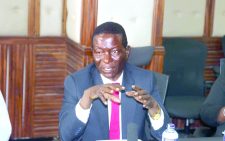Prioritise national interest in efforts to fix economy

On September 20, National Treasury Cabinet Secretary John Mbadi published a notice, inviting Kenyans to propose reforms to improve Kenya’s economic situation.
Anchored on various provisions of the Public Finance Management Act and the Constitution, the invitation sought proposals on “legislative measures to facilitate funding of county governments in case the Division of Revenue Bill and the County Allocation of Revenue Bill are not enacted by 30th of June”.
Instances when county governments have been starved of funds abound. Due to a divergence of opinion on revenue sharing between the national government and counties as proposed by the Commission on Revenue Allocation, the Senate has always thrown its lot with counties as the National Assembly unvaryingly takes sides with the national government.
But it’s the call for “legislative and administrative reforms to improve [the] social and economic well-being of Kenyans, taking into account the debt situation and need for sustainable public debt position without putting more burden on Kenyans” that made the call by the CS stand out.
It was particularly refreshing that as the new head of the finance docket in the broad-based government, Mbadi is keen to chart a new path that his predecessor had failed to map out in harnessing public input into public finance mobilisation and management processes, a slip-up that also contributed immensely to the rejection of the 2024 finance bill.
For starters, Mbadi is one of the new faces that President William Ruto appointed to his Cabinet after dismissing the previous one following the youth-led national uprising that saw the government withdraw the 2024 finance bill that Kenyans roundly rejected on account of its tax burdens, most of them imposed by the Bretton Wood institutions, the International Monetary Fund in particular.
While the deadline for submitting proposals on four result areas elapsed on October 4, consideration of public finance management is a continuous process, and hence it is not too late to comment on what the CS should possibly do in light of the challenges highlighted in his call for submissions.
Articles 211 and 212 provide for borrowing by the national and county governments, respectively, investing in Parliament the authority to prescribe by legislation terms on which the national government may borrow, and impose reporting requirements.
The Constitution goes further to mandate that “within seven days after either House of Parliament so requests by resolution, the Cabinet Secretary for finance shall present to the relevant committee, information concerning any particular loan or guarantee, including all information necessary to show the extent of the total indebtedness by way of principal and accumulated interest; the use made of the proceeds of the loan; provisions for servicing or repayment; and the progress made in the repayment”.
But Parliament is the weakest link in public debt management, often preoccupied with micromanaging the National Government Constituencies Development Fund that has effectively turned them into development extension officers, effectively making them lose focus on their core mandates of representation, lawmaking and oversight of the national executive.
Article 203 of the Constitution could be a solution to a number of the challenges that Mbadi outlined in his call for public input into public finance and debt management, providing the criteria to be taken into account in determining the equitable sharable revenue.
That article should be the primacy of Mbadi’s focus in addressing the myriad challenges highlighted in his call for ideas, prioritising the ‘national interest’ rather than debt servicing that has been the preoccupation of the Kenya Kwanza administration for the two years it has been in power.
Defining the ‘national interest’ as the first criterion for revenue sharing will reorder budgetary allocation priorities at the national and county levels, and rescue the country from the shackles of manipulation by foreign interests that have elevated debt servicing and non-priority issues at the expense of social and economic development.
— The writer is the Executive Director of the Kenya National Civil Society Centre; suba_churchill@yahoo.com












